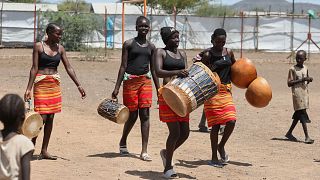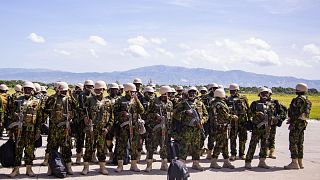Kenya
Like many other Maasai women, fish farmer Charity Oltinki was previously engaged in beadwork, but found the profession to be unprofitable.
Her husband, the primary breadwinner, was responsible for managing their cattle.
But the severe drought that struck the Horn of Africa from 2020 to 2023 killed almost 100 of their cows, and only 50 sheep of their 300-strong flock survived.
"When drought came for four consecutive years, we were severely affected. Our cows died, our sheep died. We were left with nothing. Our cows died. The lands were left bare, with nothing for the cows to graze on. So, I decided to set aside a piece of land to rear fish and monitor how they would perform, because I realised it's a good source of food. I can also take it to the market, sell, and educate my children with the proceeds," says Oltinki.
Kenya's National Drought Management Authority (NDMA) says 2.6 million cattle have died due to drought between 2020 and March 2023.
In 2023, Oltinki began fish farming as an alternative source of income to support her household.
With training from the government, she allocated a portion of their land to create a fishpond. The government further assisted by supplying pond liners, Nile Tilapia fish and feed.
After six months, the first batch of fish was harvested, with the largest fish selling for up to 300 Kenyan shillings each ($2.30 USD). Using her savings, Oltinki secured a loan and went on to drill a borehole.
Philipa Leiyan is another Maasai fish farmer who is benefiting from moving into farmed fishing.
She says: "We are still livestock keepers, however, due to climate change, most of the time, we experience drought, forcing us to relocate to other areas and our cattle still die. So, when the county government introduced us to this fish farming project, we gladly received it because we considered it as an alternative source of livelihood."
In Kajiado, like many arid and semi-arid regions, water scarcity is a significant challenge here.
To Kajiado government's initiative aims to help families diversify their income and provide a buffer against the impacts of climate change.
"The program has seen some importance to have fish farming in the rural setups," says Benson Siangot, director of fisheries in Kajiado County. "At least they have alternative livelihoods and have a diversification of food systems in order to address issues of food insecurity and malnutrition within their households."
The project is in partnership with the Aquaculture Business Development Program, and is aimed at encouraging fish consumption in the Maasai community.
Fish farming, however, is cash intensive because of expensive feed.
It also requires substantial amounts of water, which is often scarce in arid regions.
Nyang'ori Ohenjo, team leader at the Centre for Minority Rights Development (CEMIRIDE), says when fostering climate resilience, integrating activities that align with traditional livelihoods is important.
"When talking about resilience to climate change, one thing that we always have to put in mind is how can we employ indigenous knowledge and indigenous technologies in assisting communities to be resilient. So, for me, one of the things that we probably want to do is to make sure that we safeguard indigenous knowledge and indigenous technologies. How generally were pastoralists organized in terms of dealing with these seasonal drought systems? So, the knowledge that was used today, can be designed and developed in such a way that it can still assist within the current kind of challenges," he says.
As climate change intensifies, shocking scenes like these emaciated cows could become more common.
Diversification is one way people living in remote communities in Kenya can help fight back and provide a way to improve their lives.












00:28
Nairobi hawker shot at close range by police declared brain dead
01:07
Kenya prepares for first anniversary of Finance Bill protests
01:52
UN's crucial humanitarian aid work faces a clouded future amid cuts in funds
02:00
Refugees in Kenyan camp face hunger after USAID funding freeze
01:00
Pix of the Day: June 19, 2025
02:20
Protests in Kenya set to escalate, warns political analyst